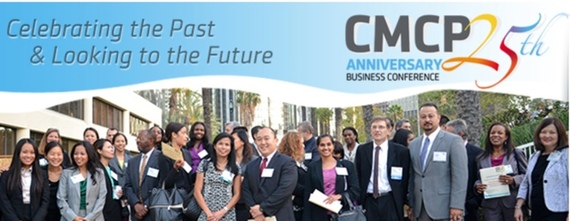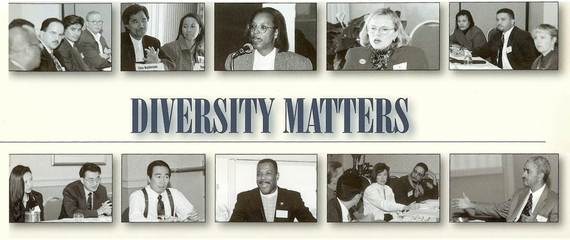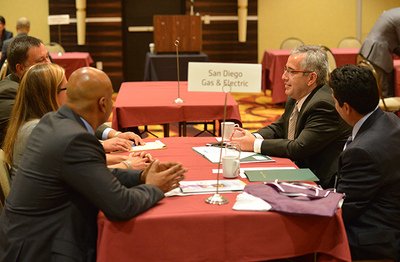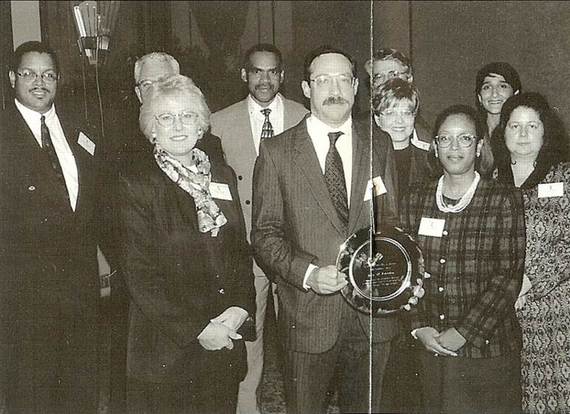When I was eight years old, I played Linus in my elementary school's musical production of "You're A Good Man, Charlie Brown." At eight years old, there was anything odd to me about an Asian boy (let alone, a gay Asian boy) playing the role of Linus. Nor was it odd that my equally Asian sister filled the role of Lucy. In my young mind, it also would have been perfectly normal to have, hypothetically, a Hispanic Charlie Brown or an African American Sally.
My adult life puts me on different stage: as a partner of a national law firm, I represent Fortune 500 and other businesses in corporate America. In this legal world, racial minorities face many challenges to becoming a star. That's why I am glad that the California Minority Counsel Program is around - and this year celebrates its 25th anniversary - to give minority business attorneys a better career stage on which they can shine.
In 1989, CMCP was founded by Dennis Archer (then a Michigan Supreme Court justice), Drucilla Stender Ramey (then executive director of the Bar Association of San Francisco), and Guy Rounsaville (Well Fargo Bank's general counsel at the time). Since its inception, its mission has been "promoting diversity in the legal profession by providing attorneys of color with access and opportunity for business and professional development."
This month, hundreds of lawyers - coming from America's largest law firms, minority-owned law firms, and in-house law departments of major corporations and public agencies - will gather in San Francisco for CMCP's annual business conference and its silver anniversary. That's because diversity is a hot topic in today's business world - including for the lawyers who serve corporate America. And while there are many legal diversity organizations, CMCP has a particular focus on this world of business lawyers. In fact, the founding members were the legal departments of five major companies - Wells Fargo Bank, First Interstate Bank, Bank of America, Chevron and Pacific Telesis Group. Today, the organization's current Executive Director, Marci Rubin, brings in-depth corporate perspective - having served as Deputy General Counsel as part of a 30-year career at Wells Fargo.
With its focus on business lawyers, CMCP provides opportunities for minority attorneys at law firms to obtain access to relationships with potential clients - especially the in-house counsel at corporations and public agencies. For in-house law departments, it provides professional development and support to achieve internal diversity goals. In 1995, then-chair of CMCP's Steering Committee Lloyd M. Johnson summed it up well: "Prior to the creation of the CMCP, Corporate Counsel who wanted to retain minority counsel, and minority counsel who wanted to represent corporations, were like ships passing in the night. The CMCP continues to serve as a unique and dynamic port of opportunity."
I'm one of the countless lawyers whose careers have benefitted from the ports of opportunity created by CMCP. I can attest to client relationships, business revenue, and professional exposure that came my way because I've been involved with CMCP.
But for all that CMCP has accomplished in its 25 years and for everything that other law diversity organizations have done, the legal industry still has far to go. In California, racial minorities make up only 20.7% of lawyers - according to the results of a December 2011 survey commissioned by the State Bar of California's Board of Governors. That survey revealed especially troubling numbers for Latino and African-American attorneys: only 4.2% of California lawyers are Latino, compared to approximately 38% of the state population (from 2010 census data). African-Americans comprise 6.6% of Californians, but only 2.7% of the state's attorneys.
The picture is also bleak at the "BigLaw" firms who serve corporate America, and especially at their partner ranks. Among the major firms who report to the National Association of Law Placement, in 2013, racial minorities from all groups made up only 7.1% of all partners (and only 4.8% of equity partners). Compare this to a nationwide population of over 36% racial minorities.
And that's just looking at racial groups. Women, LGBT and other categories of diverse lawyers face their own challenges as well.
As CMCP celebrates its silver anniversary, it's a good time to think about the future. What more can the legal industry do to improve the stage for diverse business lawyers - in California and nationwide?
First, let money talk. Not just a profession, law is a business and can take advantage of business tools. From the client perspective, that can include offering financial incentives to law firms that meet diversity goals or evaluating diversity when selecting relationship partners at law firms (steps which some major companies are already doing). This in turn helps diverse attorneys in law firms generate more business and increase their stature, which in turn empower them to effectuate internal change within their firms. But law firms can't just wait for clients or their own minority lawyers to drive the train; they can be more proactive - such as considering diversity goals in their compensation system for partners. The reality is that merely talking about diversity as a moral imperative is not enough. Finding mechanisms to financially incentivize diversity performance will be needed.
Second, remember the in-house counsel. With so much dialogue focusing on helping diverse lawyers in law firms, in-house lawyers at corporations and public agencies often get less attention. They too need professional development support to advance their careers, and even become (if they want) a General Counsel or high-ranking business executive. If more minority lawyers move up the executive ladder, the face of corporate America - and not just the legal industry - will change for the better.
Third, include straight white men in diversity efforts. Rather than have straight white male colleagues - whether in corporations or law firms - be skeptical of diversity and inclusion initiatives, we can do a better job of explaining how they too benefit. We can also help straight white men realize that everyone - including them - has some tie to race, gender, sexual orientation and other diversity in their lives. As I say, "Everyone has a DiverseStory. What's yours?" Thus, there's no reason why straight white men can't be included on diversity committees, tasked with action items or even become diversity leaders. CMCP provides a great example of this, with several straight white men serving as its Board chair or co-chair the past decade. By nurturing more allies, diversity initiatives have a much stronger chance of success.
To support these and other action steps, organizations such as the California Minority Counsel Program will remain critical and their work may never finish. But for now, let's take a moment to congratulate CMCP on its quarter century of helping to create legal stars.
Stars abounded on my childhood stage of Peanuts characters. In that realm of young innocence, everyone - irrespective of race, ethnicity, gender, sexual orientation - could shine. For the legal profession, I wish all diverse talent can star on an equally welcoming stage.
Jimmy Nguyen is a partner in the national law firm of Davis Wright Tremaine LLP. He serves on the Board of Directors of the California Minority Counsel Program, and was the organization's co-chair in 2010. The opinions in this article are, however, his own.





